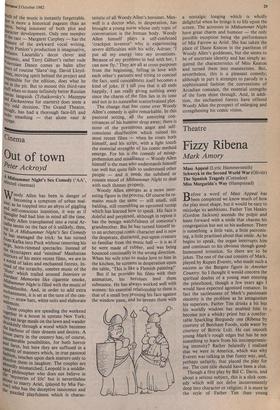Cin ema
Out of town
peter Ackroyd
Midsummer Night's Sex Comedy (`AA', Selected cinemas) Midsummer Night's Sex Comedy (`AA', Selected cinemas) WoodY Allen has been in danger of becoming a symptom of urban mal- aise; as he toppled into an abyss of giggling and self-conscious inanition, it was as if Spengler had had him in mind all the time. w °°dY Allen transplanted into a rural Ar- headia in seems on the face of it unlikely, then, , A Midsummer Night's Sex Comedy b; has managed the trick: he has turned 1(31" Kafka into Puck without removing his
no, horn-rimmed spectacles. Instead of re skyscrapers and 'minimal' Manhattan
:Iferiors of his more recent films, we are in ,w°rId of lakes and enchanted forests. In- d of the scratchy, sombre music of the gsifles' which trailed around Interiors or ,rdlist Memories like cigarette smoke, u"summer Night is filled with the music of 'leodelssohn. And, in order to add extra tuncharitment, it is set at the turn of the cen- 'e straw hats, white suits and elaborate ltences. t three couples are spending they the weekend ogether in a house in upstate New York; Y eat large meals on the lawn and wander th nicenlY through a wood which becomes e harbour of their dreams and desires. A i„°_fise Party in the country has, of course,
"ItiMerable possibilities, for both horror
and farce, but here they are suffused in a i°M.edy of manners which, in true pastoral da's. hloo, touches upon dark matters only to :olve them in laughter. The couples are a absurdly mismatched; Leopold is a middle- tte", Philosopher who does not believe in aise mysteries of life' but is nevertheless r'enit to marry Ariel, (played by Mia Far- the) who has the deceptive innocence and e Puzzled playfulness which is charac- teristic of all Woody Allen's heroines. Max- well is a doctor who, in desperation, has brought a young nurse whose only topic of conversation is the human body. Woody Allen himself plays a self-confessed `crackpot inventor' who is experiencing severe difficulties with his wife, Adrian: 'I put all my energy into my inventions. Because of my problems in bed with her, I can now fly.' They are all at cross-purposes from the beginning, falling in love with each other's partners and trying to conceal the fact, until concealment itself becomes a kind of joke. If I tell you that it all ends happily, I am really giving nothing away since the charm of the film lies in its tone and not in its somewhat scatterbrained plot. The change that has come over Woody Allen's comedy is quite remarkable. In this pastoral setting, all the annoying con- trivances of his humour drop away; there is none of the portentous angst and self- conscious disaffection which ruined his most recent films — when he treats both himself, and his script, with a light touch the essential strengths of his comic method emerge. For his is the comedy of misap- prehension and misalliance — Woody Allen himself is the man who understands himself too well but quite fails to understand other people — and it needs the subdued or roseate mood of Midsummer Night to deal with such themes properly.
Woody Allen emerges as a more inter- esting figure in the process. Of course he re- mains much the same — still small, still balding, still resembling an uprooted turnip which has learned how to speak. His face is doleful and perplexed, although in repose it has the benign watchfulness of someone's grandmother. But he has turned himself in- to an archetypal comic character and is now the desperate, distracted, put-upon creature so familiar from the music hall — it is as if he were made of rubber, and was being bounced continually in the wrong direction. When his wife tries to make love to him in the kitchen, he screams in desperation upon the table, 'This is like a Flemish painting!'
But if he provides his films with their animation, his heroines lend them substance. He has always worked well with women: his essential relationship to them is that of a small boy pressing his face against the window pane, and he invests them with
a nostalgic longing which is wholly delightful when he brings it to life upon the screen. The actresses in Midsummer Night have great charm and humour — the only possible exception being the performance of Mia Farrow as Ariel. She has taken the place of Diane Keaton in the pantheon of Woody Allen's goddesses, but she seems to be of uncertain identity and has simply ac- quired the characteristics of Miss Keaton and turned them into mannerisms. But, nevertheless, this is a pleasant comedy; although in part it attempts to parody in a sophisticated fashion the conventions of Arcadian romance, the essential strengths of the form shine through. And, in addi- tion, the enchanted forests have offered Woody Allen the prospect of enlarging and strengthening his comic vision.






































 Previous page
Previous page